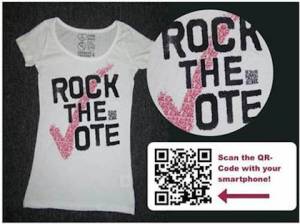How QR Codes Impact Voter Registration
 With the election just days away, QR (quick response) codes are probably the last thing on many voters’ minds. This is a technology more closely associated with marketing activities than tracking voter behaviors or sending voters to the polls.
With the election just days away, QR (quick response) codes are probably the last thing on many voters’ minds. This is a technology more closely associated with marketing activities than tracking voter behaviors or sending voters to the polls.
Younger voters, however, may be casting ballots this year based on the efforts of savvy political organizations that wisely tapped into the technology early on in the election process.
Recognizing that many students have smartphones, an organization called Rock the Vote targeted new voters in their enlistment campaign. Colleges and high schools across the country sported posters with a “Rock the Vote” QR code. Rock the Vote reps encouraged young people to scan the code to register and pledge to vote, and to join in an on-line conversation about the candidates and issues.
T-shirts given to students also carried the QR code, providing off-campus opportunities to share the goal of increased voter registration. (The organization does not support any specific candidate or political party; rather its goal is to promote awareness of social issues and embolden young people to take a stand for their political beliefs.)
Just ten states allow voters to register online. This creates quite a barrier for the approximately 44 million 18 to 29 year olds in the United States who perform many of their daily tasks via smartphones and other mobile devices.
According to comScore, 14 million Americans used QR codes in June 2011, more than half of whom were between the ages of 18 and 35.
The effort to recruit youth voters is especially important in states that have passed legislation to make voting more difficult for young people, particularly for college students attending school out-of-state. According to U.S. census data, since 2008, about one-third of young voters have moved and need to re-register at a current address.
Rock the Vote didn’t stop with college campuses or a the youthful voter as a singular target.
In a partnership with Virgin Airlines, air passengers were able to register to vote en route from San Francisco to Washington, DC. By scanning the 2D bar codes using their smartphones (via in-flight Internet service) the smartphone user was sent directly to the mobile voter registration page for fast, convenient registration, along with information on current issues.
The question remains: Will this new technology affect the outcome of the election? Of course, we won’t know the outcome itself for another couple of weeks, and it will take additional analytics to determine the impact of QR codes on online voter registration.
Although anecdotal, it does appear that QR codes have an effect on potential voter behavior when used with other social media such as Facebook and Twitter, or “routine” communication strategies like email. In terms of other activities like branding candidates, organizing volunteers in the field, collecting supporters’ data, and especially fundraising, QR code technology may prove to be of significant impact.
(Image courtesy of Rock the Vote.)
See related articles:
Square Off: Obama and Romney use Mobile Payments for Political Fundraising - ... used by the campaign to target supporters who already contributed but might be interested in contributing more. Aside from Square, Obama also has mobile ads pointing to a mobile site that allows voters ...
Resource Page: Scanner Apps for Smartphones & Tablets - ... Free Gaming App For Android Microsoft Tag Helping Voters 'Be Ready to Vote' Barcode Scanner Apps for Business CashierLive iPhone Inventory Bar Code Scanner Mobile POS and Bar Code Reading ...
Mindshare Technologies Uses Mobile QR Codes to Get Customer Feedback - Mindshare Technologies has recently adopted Quick Response (QR) code technology to help obtain customer feedback. QR codes are a type of bar code that can be printed on sales receipts and product ...{jcomments on}
